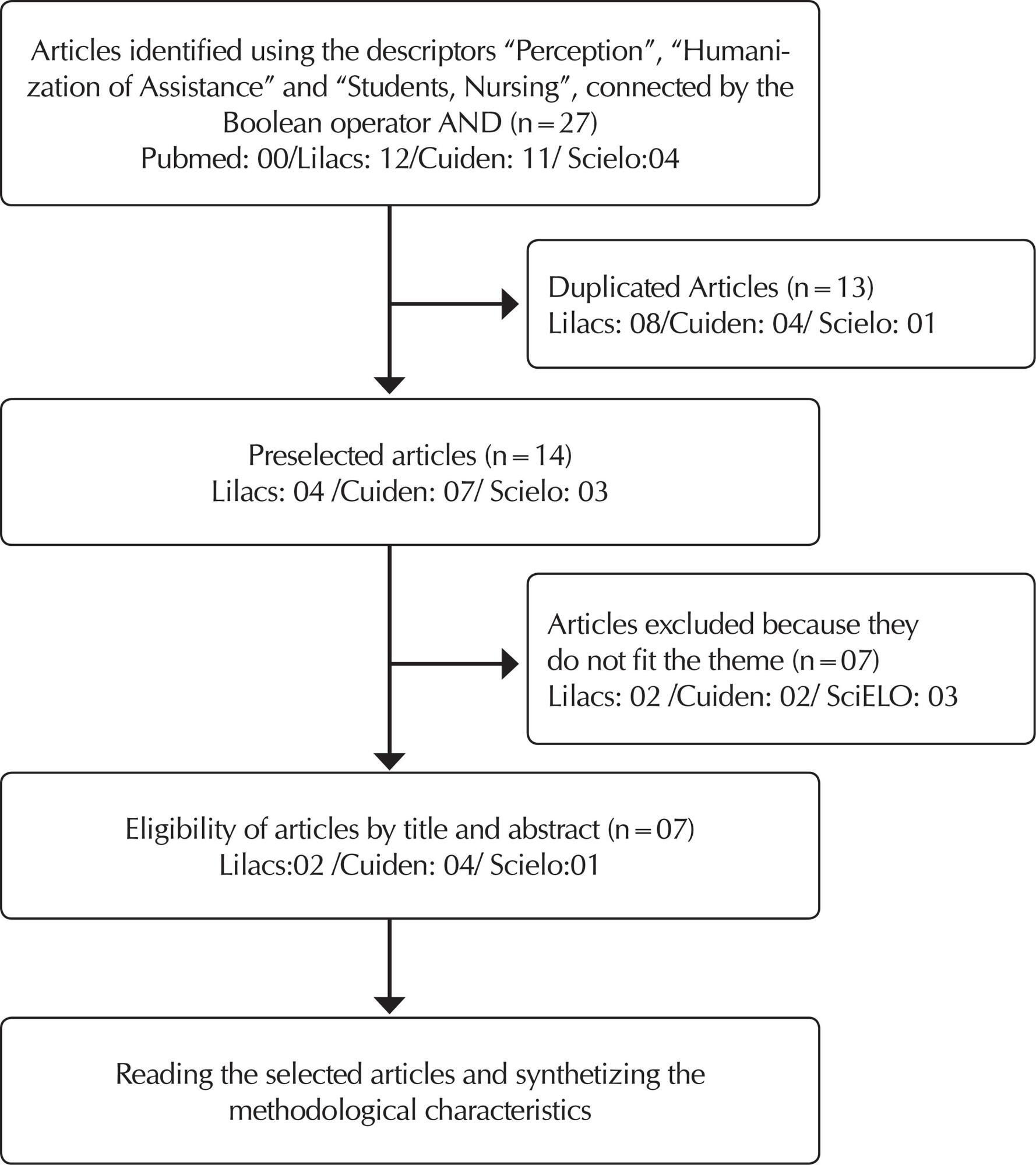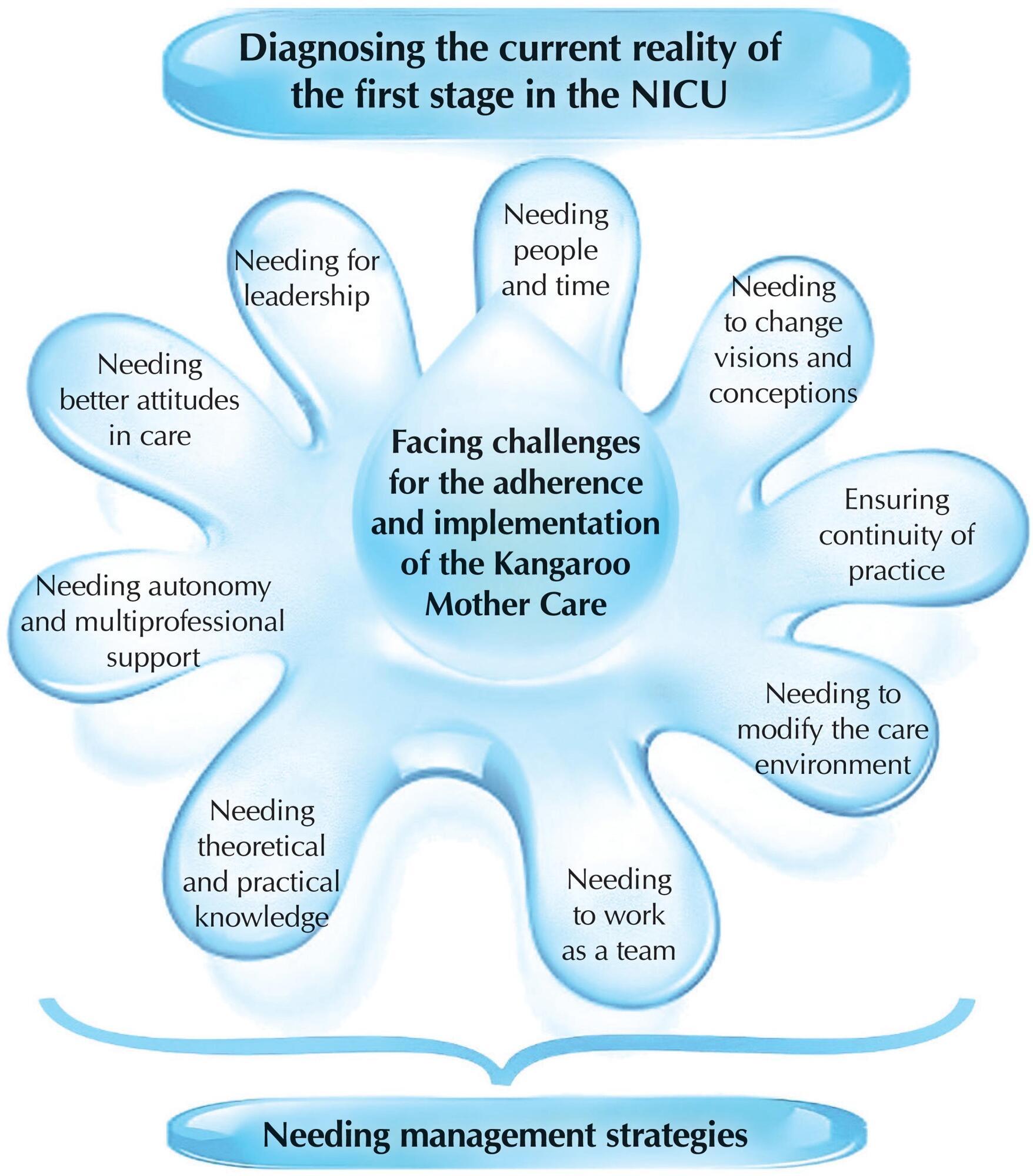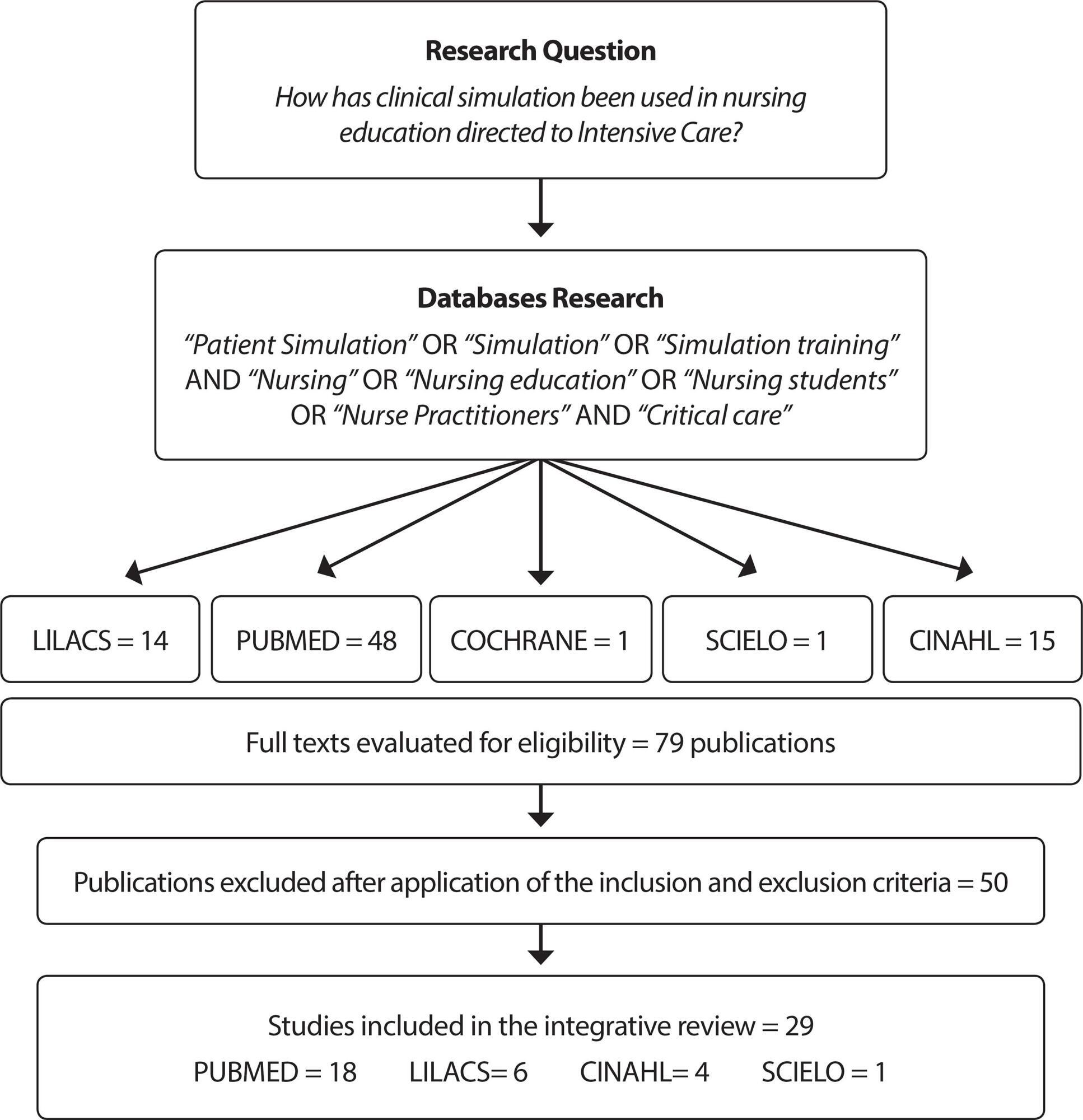-
REVIEW01-01-2018
Nursing Interventions in the Enhanced Recovery After Surgery®: Scoping Review
Revista Brasileira de Enfermagem. 2018;71:2824-2832
Abstract
REVIEWNursing Interventions in the Enhanced Recovery After Surgery®: Scoping Review
Revista Brasileira de Enfermagem. 2018;71:2824-2832
DOI 10.1590/0034-7167-2018-0436
Views0See moreABSTRACT
Objective:
To identify the Nursing interventions, described in literature, in the ERAS® program.
Method:
We defined a scoping review based on the recommendations of The Institute Joanna Brigs (JBI) and on research in electronic databases. We chose the studies through flow diagrams “Preferred Reporting Items for Systematic Reviews and Meta-Analyses (PRISMA)” and presented them in a chart.
Results:
We found 306 articles published between 2010 and 2018 and included 14 of them. The main results were: the crucial role nurses play throughout the surgical process, which begins at the preoperative nursing consultation; goes to post-operative care, such as early giving food to patients, effective management of pain or early mobilization; and ends in telephone follow-up.
Conclusion:
The introduction of the surgical program ERAS® may be an opportunity for nurses to play a more influential role in the surgical path, directly involving with their clients’ results.

-
REVIEW01-01-2018
Quality of life in children with kidney transplant: Systematic review
Revista Brasileira de Enfermagem. 2018;71:2818-2823
Abstract
REVIEWQuality of life in children with kidney transplant: Systematic review
Revista Brasileira de Enfermagem. 2018;71:2818-2823
DOI 10.1590/0034-7167-2018-0464
Views0See moreABSTRACT
Objective:
To identify in the literature studies that evaluate the quality of life in pediatric patients with kidney transplant through use of specific, validated instruments in Pediatrics.
Method:
Systematic review of the literature with searches conducted in the following databases: Medline, PubMed, LILACS, CINAHL, SciELO and Cochrane Library. Main keywords: Quality of life, Kidney transplantation and Pediatrics.
Results:
A total of 366 studies were selected and eight observational studies were included that evaluated the quality of life of children with kidney transplant by means of evaluation instruments of quality of life.
Conclusion:
The quality of life of children with kidney transplant is inferior compared to healthy children. The post-transplant period presents better results compared to pre-transplant children. The identification of mental, physical and social conditions related to the quality of life of this population allows for better planning the assistance provided to them.

-
REVIEW01-01-2018
Nurses’ contributions to good practices in child care: an integrative literature review
Revista Brasileira de Enfermagem. 2018;71:2808-2817
Abstract
REVIEWNurses’ contributions to good practices in child care: an integrative literature review
Revista Brasileira de Enfermagem. 2018;71:2808-2817
DOI 10.1590/0034-7167-2018-0416
Views1See moreABSTRACT
Objective:
to identify scientific evidence on the contribution of nurses’ work to good practices in child care in the Brazilian literature.
Method:
integrative review of the literature, carried out in Latin American and Caribbean in Health Sciences Literature (LILACS), Medical Literature Analysis and Retrieval System Online (MEDLINE), Brazilian Nursing Database (BDENF), Cumulative Index to Nursing and Allied Health Literature (CINAHL) and Scientific Electronic Library Online (SCIELO) database, from 2008 to 2018.
Results:
14 complete studies were selected for interpretative analysis. Two categories allowed responding to the initial questioning of the study, namely: Nurses’ contributions in child care; and Limits for the nurse’s role in child care.
Conclusion:
evidences show the importance of nurses in child care for the promotion of comprehensive care for children and their families. However, there are socioeconomic, cultural, institutional and technical factors that hinder the nurses’ performance in this setting.

-
REVIEW01-01-2018
Nursing students’ perception about humanized care: an integrative review
Revista Brasileira de Enfermagem. 2018;71:2800-2807
Abstract
REVIEWNursing students’ perception about humanized care: an integrative review
Revista Brasileira de Enfermagem. 2018;71:2800-2807
DOI 10.1590/0034-7167-2017-0845
Views0See moreABSTRACT
Objective:
To analyze the productions of knowledge about the students’ perception of humanized care.
Method:
Study of bibliographical revision of the integrative type. The databases Pubmed, Lilacs, Cuiden and the SciELO virtual library were chosen for selection in October 2017, using the health descriptors “Students, Nursing”, “Perception” and “Humanization of assistance”, in the languages Portuguese, English and Spanish.
Results:
Only eight studies were included that met the objectives of the study, where the majority portrays the Brazilian reality.
Conclusion:
Given the current discussion of society on the subject and the scarcity of publications, it is clear the need to adapt the academic field to complaints of society, as well as reflection of why the problem does not have a significant approach in international setting.

-
RESEARCH01-01-2018
Use of vitamin D and infection in patients with chronic kidney disease
Revista Brasileira de Enfermagem. 2018;71:2792-2799
Abstract
RESEARCHUse of vitamin D and infection in patients with chronic kidney disease
Revista Brasileira de Enfermagem. 2018;71:2792-2799
DOI 10.1590/0034-7167-2018-0640
Views0See moreABSTRACT
Objective:
To evaluate the effectiveness of vitamin D supplementation as protection factor against infection of patients with chronic kidney disease on conservative treatment.
Method:
Retrospective cohort study carried out between 2013 and 2016 in the Conservative Treatment Outpatient Clinics (Ambulatório de Tratamento Conservador) of the Hypertension and Kidney Hospital (Hospital do Rim e Hipertensão) of the Universidade Federal de São Paulo. Data on sociodemographic factors, comorbidity, infection episodes and use or nonuse of vitamin D supplementation for at least 6 months were collected from medical records. The primary outcomes considered in both groups were: presence or absence of infection anywhere on the body (bloodstream, urinary, respiratory and surgical sites).
Results:
A total of 263 patients were included and those who received (n=43) vitamin D had 59% less chance of developing infections (OR=0.41; 95%CI; 0.15-0.99), when compared to those who did not receive.
Conclusion:
Vitamin D supplementation was a protective factor against infections of all causes.
-
RESEARCH01-01-2018
Management challenges for best practices of the Kangaroo Method in the Neonatal ICU
Revista Brasileira de Enfermagem. 2018;71:2783-2791
Abstract
RESEARCHManagement challenges for best practices of the Kangaroo Method in the Neonatal ICU
Revista Brasileira de Enfermagem. 2018;71:2783-2791
DOI 10.1590/0034-7167-2018-0428
Views0See moreABSTRACT
Objective:
To understand the conditions that influence the adherence and application of best practices by nurses in the context of the Nursing care management in the Kangaroo Mother Care in the Neonatal ICU.
Method:
Study of qualitative approach, whose theoretical and methodological frameworks were Symbolic Interactionism and Grounded Theory, respectively. We used the in-depth interview with 8 nurses from the Neonatal ICU of a public maternity hospital in the city of Rio de Janeiro.
Results:
The conditions involved in adhering to the best practices of humanization in the Neonatal ICU are related mainly to human resources, interaction among professionals, work processes and leadership strategies; and care management.
Conclusion:
Professional and institutional challenges have been identified that need to be addressed to improve adherence and implementation of the Kangaroo Mother Care best practices.

-
RESEARCH01-01-2018
Good practices for patient safety in the operating room: nurses’ recommendations
Revista Brasileira de Enfermagem. 2018;71:2775-2782
Abstract
RESEARCHGood practices for patient safety in the operating room: nurses’ recommendations
Revista Brasileira de Enfermagem. 2018;71:2775-2782
DOI 10.1590/0034-7167-2018-0449
Views0See moreABSTRACT
Objective:
To describe nurses’ recommendations for good patient safety practices in the operating room.
Method:
Quantitative, descriptive and exploratory research developed from an online survey of 220 operating room nurses from different regions of Brazil. The data processing for textual analysis was performed by the software IRAMUTEQ.
Results:
There were eight recommendations: (1) Involvement of the multiprofessional team and the managers of the institution; (2) Establishment of a patient safety culture; (3) Use of the safe surgery checklist; (4) Improvement of interpersonal communication; (5) Expansion of nurses’ performance; (6) Adequate availability of physical, material and human resources; (7) Individual search for professional updating; and (8) Development of continuing education actions.
Conclusion:
These recommendations can be used as care management strategies by nurses for patient safety in the operating room.

-
RESEARCH01-01-2018
The care of nurses in the Family Health Strategy: practices and theoretical foundation
Revista Brasileira de Enfermagem. 2018;71:2767-2774
Abstract
RESEARCHThe care of nurses in the Family Health Strategy: practices and theoretical foundation
Revista Brasileira de Enfermagem. 2018;71:2767-2774
DOI 10.1590/0034-7167-2018-0383
Views0See moreABSTRACT
Objective:
To analyze the practices of nurses working in the Family Health Strategy (FHS) in a city of Rio de Janeiro (RJ) and the theoretical foundations that guide them.
Method:
Qualitative research through semi-structured interviews with twelve nurses working in eleven FHS units between August and December 2014. Data were organized by hermeneutic-dialectical analysis.
Results:
The nurse is inserted in the municipal FHS as care coordinator and political agent; has practices aimed at welcoming, mobilizing social groups, making technical and monitoring of users through health programs. The practices remain in the confrontation of problems and are guided by technical manuals and coordination of health programs.
Final considerations:
Studies are needed to recognize the nurse’s therapeutic objective at the FHS and to propose theoretical foundations, specific to Nursing or Collective Health that will instrumentalize their daily practice.
-
ORIGINAL ARTICLE06-08-2020
Usability of a mobile application on diabetic foot self-care
Revista Brasileira de Enfermagem. 2020;73(4):e20180862
Abstract
ORIGINAL ARTICLEUsability of a mobile application on diabetic foot self-care
Revista Brasileira de Enfermagem. 2020;73(4):e20180862
DOI 10.1590/0034-7167-2018-0862
Views0See moreABSTRACT
Objectives:
to assess the usability of an app prototype for diabetic foot self-care by an end user.
Methods:
a descriptive study that uses heuristic assessment of a hybrid app usability. Fifteen users of an outpatient diabetes care service in a capital of Northeastern Brazil participated in the study during April 2018. The usability measurement tool called Smartphone Usability questionnaiRE was applied.
Results:
the lowest score was 77 and the highest was 112, with an average usability of 96.1 points. Usability was framed in the last two levels, 70 and 8o. Users now strongly agree (level 70) and fully (level 80) with the assessed items, which represents good usability of the apps prototype.
Conclusions:
the final product developed focuses on user needs and requirements, which can ensure usability based on effectiveness, efficiency and satisfaction triad.
-
08-19-2019
Clinical simulation in nursing education in intensive therapy: an integrative review
Revista Brasileira de Enfermagem. 2019;72(4):1061-1070
Abstract
Clinical simulation in nursing education in intensive therapy: an integrative review
Revista Brasileira de Enfermagem. 2019;72(4):1061-1070
DOI 10.1590/0034-7167-2018-0217
Views0See moreABSTRACT
Objective:
to analyze the publications on clinical simulation practices for education in Nursing in Intensive Care.
Method:
an integrative review carried out through LILACS, PubMed, Cochrane Library, CINAHL and SciELO databases, of articles published from 2008 to 2017.
Results:
29 articles were selected, of which 76% discuss the use of simulation in continuing education of nursing professionals, while the others describe their use for student education. There is a higher prevalence of studies with a level of evidence 6 (17), with 28 international publications. There was an increase in scientific production, with 16 articles published in the last three years.
Conclusion:
variables after simulation use, such as confidence, communication skills, efficiency in the identification of clinical worsening of patients, development of technical skills, teamwork and clinical decision-making, presented a significant improvement, demonstrating that this tool is effective in qualifying care for critical patients.

-
ORIGINAL ARTICLE09-16-2019
Social incentives for adherence to tuberculosis treatment
Revista Brasileira de Enfermagem. 2019;72(5):1182-1188
Abstract
ORIGINAL ARTICLESocial incentives for adherence to tuberculosis treatment
Revista Brasileira de Enfermagem. 2019;72(5):1182-1188
DOI 10.1590/0034-7167-2017-0654
Views0See moreABSTRACT
Objective:
To analyze the influence of social incentives for adherence to tuberculosis (TB) treatment.
Method:
Qualitative study, in which 26 primary health care professionals of São Paulo were interviewed in 2015.Their testimonies were submitted to the speech analysis technique. The theoretical reference was the social determination of the health-disease process. Ethical procedures were observed.
Results:
TB is related to precarious living conditions. Incentives such as the basic food basket and transportation stipends are relevant for patients’ adherence to treatment, as well as to the create bonds between the patient and the health team.
Final considerations:
The incentives strengthened adherence to TB treatment. However, interventions in the context of public measures must transcend the remedial dimension and be guided towards the transformation of the TB situation, which means supporting processes that modify living conditions.
-
REFLECTION05-03-2021
Florence Nightingale’s theory and her contributions to holistic critical thinking in nursing
Revista Brasileira de Enfermagem. 2021;74(2):e20200139
Abstract
REFLECTIONFlorence Nightingale’s theory and her contributions to holistic critical thinking in nursing
Revista Brasileira de Enfermagem. 2021;74(2):e20200139
DOI 10.1590/0034-7167-2020-0139
Views0See moreABSTRACT
Objective:
to reflect on Florence Nightingale’s legacy and describe her contributions to critical holistic thinking in nursing.
Methods:
this is a theoretical reflection, for which scientific productions on Florence Nightingale’s environmental theory, as published in national and international journals, were based.
Results:
Florence Nightingale’s philosophy and teachings emphasize that the nurse must use her brain, heart and hands to create healing environments to care for the patient’s body, mind and spirit. Nursing, since the time of Nightingale, has been building the holistic paradigm, in all schools of thought, with a view to a humanistic approach to the human being in their indivisible relationship with the environment.
Final considerations:
Florence’s contributions to holistic critical thinking in nursing are evident, constituting nurses’ differential in clinical practice.
-
ORIGINAL ARTICLE07-01-2020
Homeless population: characterization and contextualization by census research
Revista Brasileira de Enfermagem. 2020;73(5):e20190236
Abstract
ORIGINAL ARTICLEHomeless population: characterization and contextualization by census research
Revista Brasileira de Enfermagem. 2020;73(5):e20190236
DOI 10.1590/0034-7167-2019-0236
Views0See moreABSTRACT
Objectives:
to analyze characteristics of homeless people and factors associated with living on the streets.
Methods:
a census-type sectional survey carried out between 2015 and 2018, in the municipality of Maringá-Paraná. A total of 701 homeless answered a structured questionnaire with sociodemographic data, living conditions, and drug use. We used Pearson’s correlation test for the association analysis of the variables at a 95% confidence level.
Results:
men (90.7%) the average age of 37.7 years had been homeless for an average of 5.39 years. Most had little education (54.2%), and homelessness was due to drug use (47.2%) and family disagreements (38.9%).
Conclusions:
drug use and family disagreements were the main reasons for homelessness. Time on the street, gender, and drugs were associated with a negative correlation to be homeless; and age, mean daily income, the number of daily meals, having been in prison, and having an income source were associated with positive correlation.
-
ORIGINAL ARTICLE10-21-2019
Religious/spiritual coping and spiritual distress in people with cancer
Revista Brasileira de Enfermagem. 2019;72(6):1534-1540
Abstract
ORIGINAL ARTICLEReligious/spiritual coping and spiritual distress in people with cancer
Revista Brasileira de Enfermagem. 2019;72(6):1534-1540
DOI 10.1590/0034-7167-2018-0585
Views0See moreABSTRACT
Objective:
To investigate the relation between the presence of spiritual distress and use of RSC and sociodemographic, clinical and religious/spiritual variables in people with cancer.
Method:
Cross-sectional study conducted in an association for support to people with cancer. The data obtained with the tools were analyzed using the Spearman‘s correlation coefficient and the Mann-Whitney Test.
Results:
129 volunteers participated in the study, of which 57% showed moderate spiritual distress, 96% used medium and high positive religious/spiritual coping. Spiritual distress showed positive correlation with negative religious/spiritual coping (P<0.001) and inverse correlation with age (p 0.002). The use of positive religious coping was statistically significant in people who have religious practices (p 0.001).
Conclusão:
Spiritual distress is a phenomenon that is present in the lives of people with cancer and has significant relation with the use, in a negative manner, of religion/spirituality as a way of coping with the disease.
-
REVIEW06-26-2023
Barriers to Pre-Exposure Prophylaxis (PrEP) use for HIV: an integrative review
Revista Brasileira de Enfermagem. 2023;76(3):e20210963
Abstract
REVIEWBarriers to Pre-Exposure Prophylaxis (PrEP) use for HIV: an integrative review
Revista Brasileira de Enfermagem. 2023;76(3):e20210963
DOI 10.1590/0034-7167-2021-0963
Views0See moreABSTRACT
Objectives:
to identify and synthesize scientific evidence on the barriers and difficulties for Pre-exposure Prophylaxis (PrEP) use and compliance for HIV.
Methods:
an integrative literature review, using the MEDLINE/PubMed, Cumulative Index to Nursing and Allied Health Literature (CINAHL), Academic Search Premier and Scopus (Elsevier) databases.
Results:
all (100%) the articles included identified that PrEP users experience some type of structural barrier related to health services such as long distance from the units, suboptimal logistics for taking pills and professional resistance to prescribing PrEP. Furthermore, 63.21% identified social barriers, such as stigma about sexuality and HIV, in addition to individual barriers such as alcohol use, adverse effects, and concerns about long-term toxicity.
Conclusions:
the barriers to PrEP use are multifactorial. Effective interventions are needed to support PrEP users in accessing, complying with, and retaining health services.

-
EXPERIENCE REPORT10-26-2020
Brazilian Nursing Process Research Network contributions for assistance in the COVID-19 pandemic
Revista Brasileira de Enfermagem. 2020;73:e20200798
Abstract
EXPERIENCE REPORTBrazilian Nursing Process Research Network contributions for assistance in the COVID-19 pandemic
Revista Brasileira de Enfermagem. 2020;73:e20200798
DOI 10.1590/0034-7167-2020-0798
Views0See moreABSTRACT
Objective:
to describe the theoretical construction process of nursing process support documents in COVID-19 care scenarios.
Methods:
an experience report of the joint activity of the Brazilian Nursing Process Research Network (Rede de Pesquisa em Processo de Enfermagem) composed of Higher Education and Health Institution researchers in Brazil.
Results:
five instruments were organized collectively, involving the elements of nursing practice (nursing diagnoses, outcomes and interventions) in assistance for community; for patients (with suspected or mild, moderate, and critical COVID-19 and residents in Nursing Homes); for nursing workers’ health support, also subsidizing registration and documentation during the COVID-19 pandemic.
Final considerations:
valuing the phenomena manifested by families/communities, patients and health professionals is essential for early detection, intervention, and prevention of diseases.
Search
Search in:
Nuvem de Tags
Adolescente (85) Atenção Primária à Saúde (239) COVID-19 (91) Criança (91) Cuidados de Enfermagem (269) Educação em Enfermagem (151) Educação em Saúde (139) Enfermagem (930) Enfermagem Pediátrica (86) Estudantes de Enfermagem (77) Estudos de Validação (131) Família (87) Idoso (208) Promoção da Saúde (99) Qualidade de Vida (104) Saúde do Trabalhador (86) Saúde Mental (145) Saúde Pública (82) Segurança do Paciente (150) Tecnologia Educacional (100)



